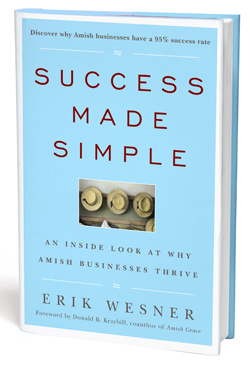 The most successful businesses in Pennsylvania don’t reside in big-city high-rises or suburban corporate parks. Rather, there is a segment of entrepreneurs who have long called the rural farmlands of Lancaster County home and boast a 95 percent success rate.
The most successful businesses in Pennsylvania don’t reside in big-city high-rises or suburban corporate parks. Rather, there is a segment of entrepreneurs who have long called the rural farmlands of Lancaster County home and boast a 95 percent success rate.
The Amish.
That’s right, throw away your preconceived notions culled from Hollywood or summer vacations. A new book by Erik Wesner, who studied at Elizabethtown College and has spent a large part of his professional life working alongside and researching the Amish, explains how their culture helps sustain successful businesses like woodworking, construction and farmers market stands.
In “Success Made Simple,” Wesner, who splits his time between Poland (his parents originate from there), North Carolina and various Amish communities, traces the Amish entrepreneurial story from the farm to the storefront. Farming is still the ideal occupation for the Amish, but since land has become more scarce and more expensive, they have been forced to develop other sources of income through entrepreneurial efforts
With 51,000 of the nation’s 230,000 Amish, Pennsylvania is home to the second-largest Amish population in the country and Wesner based much of his book in Lancaster County, home to the majority of the Commonwealth’s Amish community. Generally, Wesner says, the entrepreneurial development of the Amish has been a good thing for local economies and has allowed the culture to thrive in fields other than those of corn or wheat.
Keystone Edge (KE): Is the moral of the story really about simplifying your goals, your mission, your vision?
Erik Wesner (EW): The idea is figuring out the “why” behind your business. Defining success is an important part of it. I talk about it with the Amish a lot, and you get a definite impression of the emphasis on the economic aspect but that not being the end goal, so to speak. The Amish have historically de-emphasized accumulation of wealth. When all the Amish were on the farm four or five decades ago, you really didn’t find a lot of differences among them. Your income was going to be pretty close to your neighbors and you weren’t going to get rich (other than appreciation in land values). With the change in business culture entering Amish society, they’re dealing with the wealth question. How will it impact their society? How does it help them be a provider in their community? How will it help them give back. There’s definitely an emphasis on business being a vehicle to those end goals.
 KE: We always hear about differences between the Amish and the rest of America. What are some of the most striking or unlikely similarities you’ve found in your work with them?
KE: We always hear about differences between the Amish and the rest of America. What are some of the most striking or unlikely similarities you’ve found in your work with them?
EW: I’d say on a basic level, when you spend a good bit of time in Amish society, they’re people just like we are. They have similar concerns and goals and they’re very committed to their faith and they live that out on the day-to-day more than most other groups in America. They have a sense of humor, enjoy leisure time. It’s not like they’re restricting themselves out of a sense that they should be suffering. They enjoy a lot of the things we do. There are driven Amish, which seems like an oxymoron when you think of how serene they’re supposed to be.
This can be an issue in Amish society because they appreciate the small-scale aspect. There are a lot of Amish business people I’ve talked to who say they’ve had to restrict their growth and turn away business because they’re getting too big. I think it’s served them well to take a more conservative approach in some ways.
KE: Mentorship has gained a strong foothold in mainstream entrepreneurship education, but is it even more valued among the Amish?
EW: In the Amish community it plays a huge role. It comes out of a couple things. The Amish appreciate education and training that gives practical skills. That’s why they don’t go to school past eighth grade. They appreciate the professionals that go through it but not for themselves. They’re emphasizing practical skills. When you have uncles and cousins who have business experience and you get out of school at age 14 or 15, you’ll be working maybe at home or the shop down the road. Learning practical skills and managerial skills as well, that all translates. Yet the Amish realize that with an eighth-grade education and existing in a different cultural setting that there are holes that need to be plugged as well.
KE: How might have Amish entrepreneurs been better equipped to handle the recession?
EW: They have an appreciation for small scale; it’s sort of an ingrained cultural characteristic reinforced everywhere in Amish society. The importance of family is ingrained in business and the typical Amish boss realizes his employees are going to be spouses or parents. So when a stone mason triples his payroll, he looks at it as going from having three families to feed to having nine to feed. That attitude, that they’re responsible for these people involved, plays into decisions they make and how quickly they grow the business. That helps Amish entrepreneurs have a more conservative approach. They tend to take out loans only for necessities. You don’t see a lot of frills in Amish businesses. That whole mentality allows them to be more flexible. They might transition from making outdoor furniture to indoor furniture more easily than someone who has more debt.
They talked about the recession during my interviews. The construction industry has been hard hit and that might impact their success rates, but I don’t know if it would be as significant as in non-Amish communities. A number of Amish builders I’ve talked to shifted their focus to the remodel industry, a segment of the market that would do better when people aren’t buying.
KE: Which PA Amish entrepreneur impressed you the most and why?
EW: One that immediately comes to mind is Jake Stoltzfus. He ran a harness shop for a number of years and was sort of one of the pioneer businesses in Lancaster County that spawned a lot of spinoff businesses. He was really a pioneer in that he had that drive and desire to succeed, a type-A go-getter type. He kind of got to a point recently that he found some of his definition of success wasn’t exactly being fulfilled. I talk about his family in the book. He wanted to have something to pass on to the next generation. There’s an appreciation the Amish have for that, which is rooted in their agricultural background. His children weren’t interested in taking over the business, so he sold his business. As a way of getting his family more involved and because he enjoys a challenge, he opened a sandwich shop in Philadelphia’s Reading Terminal. He has enjoyed the process and he gets a kick out of the learning curve. And it might be more rewarding and satisfying because he has more family involved.
Joe Petrucci is managing editor of Keystone Edge. Send feedback here.
To receive Keystone Edge free every week, click here



